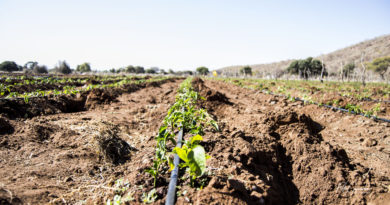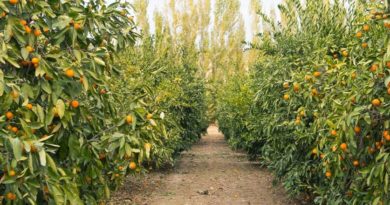Success With Backyard Farming
Godfrey Segale , a back yard farmer located in Otse, about 50km south of the capital Gaborone, shares with Farmers Review his views on backyard farming.
Even though some politicians have questioned the sustainability of backyard gardening, Segale believes that with proper implementation and backing policies, urban agriculture or backyard gardening as it is commonly known locally, can move from a simple, traditional informal activity to an organized initiative that has the potential to become a dynamic player in the economy as well as in the local food security and poverty reduction strategies.
While folks around the world have long grown vegetables in backyard plots, modern gardening goes a step further by making use of containers such as plastic lined wooden crates, custom-built tables and even old car tyres. It integrates horticulture production techniques with environmentally friendly technologies suited to cities, such as rainwater harvesting and household waste water management. Innovative farmers can go as far as vertical farming which allows them to even producing high volumes in limited spaces with a limited water supply.
According to information shared by Food and Agricultural Organization, a backyard garden can produce roughly 200 tomatoes (30 kg) a year, or 36 heads of lettuce every 60 days, or even 10 heads of cabbages every 90 days or 100 onions every 120 days from one square metre.
To ensure a regular water supply, backyard gardeners can channel rainwater into storage via a system of gutters and pipes. Rainwater is virtually free (after the investment in harvesting equipment) and usually of good quality. From a roof of 20 sqm, growers can collect 2 000 litres of water for every 100 mm of rainfall, enough for the year-round cultivation of a backyard garden of two square metres. Keeping backyard gardening productive is also fairly simple. They can be fertilized regularly, at no cost, with compost produced from a chicken coop. Pests are controlled by non-chemical means, including coloured sticky traps, insect proof nets and intercropping with aromatic herbs that naturally repel insects, such as basil, parsley and mint.
“Urban farming or backyard gardening allows low-income families to meet their needs for vitamins, minerals and plant protein by providing direct access to fresh, nutritious vegetables every day.” Segale emphasizes.
Low-income families can also use Urban farming as a source of extra income from the sale of small surpluses from their gardens. Segale goes on to explain that while Urban farming encourages innovation, they are also so easy to look after, meaning anyone including women, men, children, the elderly and the disabled can easily manage them.
Segale, who is a teacher by profession and currently teaches Social Studies at Moeding, says he realised he had passion for farming during his childhood while he was still at school.
“During our time, the education system was such that we went for theory in the mornings and then practicals like brick making, building and crop production in the afternoon.” he explains
Segale says he would have loved to enrol in an agricultural related course at Tonota College of Education where he did his teacher training but couldn’t as it wasn’t there at the time. Lack of any formal training meant that for him it was all trial and error at the beginning of his backyard farming journey.
” Initially I started with Orpington chickens.” Says Segale. There was no particular reason for his choice save for he had to start somewhere. Part of his motivation was the need to earn extra income because after enrolling for further studies at University of Botswana he was put on ‘half salary’ which wasn’t enough to sustain his family.
As he continued with his farming, he got to realise that in farming he rather loved horticulture more than anything else and that’s when he decided to use his backyard at Moeding teachers residence for production. Currently he supplies a supermarket in Otse called Tikonko with tomatoes, green pepper, rape and cabbage. He hopes to start supplying Saverite supermarket in Otse soon as well as other outlets in Gabane.
Where no land is available, vegetables can be planted in a containers filled with garden soil or a substrate made from local materials, such as peanut shells, maize or sorghum husks or coarse sand. If substrates are unavailable, there is another option: Hydroponics. That is, growing the vegetables on water enriched with a soluble fertilizer.
Like any other business he has challenges too. Top of the pile is prices. He has been reduced to a price taker as market prices are low and dictated by retailers. Then there are people who always ask for freebies or those that take his produce on credit and then send him from pillar to post when it’s time to pay. Some of the none payments though, are due to Segale’s poor record keeping.
” My goal and vision is to help and empower members of my community. ” He explains.
Apart from sharing knowledge on backyard seedling production with members of his community, he also gives out some of his produce for consumption to disadvantaged members of Otse as well as during funerals around the village.
To Segale, being a backyard farmer isn’t a static job. He says that a farmer can’t depend on old farming methods forever if he/she wants to be successful. A lot of dynamics can change at any time and one has to be ready for such changes, especially if they are negative. Issues such as markets or policies can change. Consumer preferences and the need to know how the products are produced can change too. Most importantly, in this era, technological advances can be harnessed for maximum and efficient production. ” As a farmer you need to continuously invest in yourself and learn new effective ways of doing your job.” He emphasizes.
Segale has a 16hactare farm which he is currently developing through funds gained from his backyard farm in Sikwane. His ultimate dream is to resign from his teaching job and concentrate on farming fulltime. Until then, Segale encourages any aspiring farmers out there without spaces to look to backyard farming as a solution.
” Call it doing what you have to do in order to reach your dreams. ” He concludes



